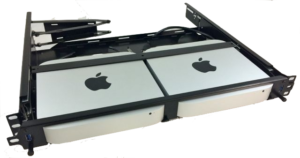How Can I Ensure Uninterrupted Operation of timeSensor LEGAL?
General Overview
The larger your firm, the more sensitive you will be to service interruptions due to data backup, maintenance, and failure (e.g., hardware crashes). With a large firm and a big dataset, potential service interruptions can become quite long. A mirror server is an good solution to solve this problem.
What Is a Mirror Server?
A mirror server is a second machine on the same network as the production server. The purpose of this machine is to provide full redundancy. It can be switched to very rapidly in the case the production server fails. The mirror server will function as the new production server in the case of a hardware failure. The former production server will then be fixed, and after it is repaired it will become the new mirror server.
To Implement this Configuration, You Will Need:
- A second server (the two servers should have approximately the same hardware configuration so that the mirror server can become the main production server in the case of a failure)
- The “Mirroring” module for the timeSensor LEGAL software
- A server maintenance contract with timeSensor AG that ensures proper configuration and monitoring of the system
How Does the Mirror Server Function?
The mirror server is integrated as the second server on your network. Then a copy of the database is transferred from the production server to the mirror server. The mirror server is started in the special “mirror server” mode.
The production server will now send all changes (all “transactions”) to the mirror server's database periodically (for example, every 10 minutes). The mirror server integrates these transactions into its database, and after a short time delay it will reflect the current data state of the production server.
What Is the Advantage of a Mirror Server?
If the production server fails, the administrator can with a few clicks turn the mirror server into the new production server. In just a few minutes all users will be able to log in and get back to working with the database. The data loss is minimal.
By comparison, it can take between several hours and a few days to repair a faulty server (repair/replacement of the server machine, restoration of data from backup, configuration, etc.). The data loss in this case is up to one day (assuming the restoration of data from the previous night's backup).
What Is the Disadvantage of a Mirror Server?
One trade-off for the higher security that your mirror server provides is the fact that your timeSensor LEGAL system is somewhat more complex. The “plug & play” philosophy, such as the ability to automatically update software, is not compatible with the use of a mirror server. Your system must be professionally managed with correspondingly higher operating costs. This is the typical trade-off between security and convenience/cost. Therefore, we recommend the use of a mirror server only if your firm employs at least approximately 20 employees.
You Will Still Need to Perform Secondary Backups
While the mirror server functions as a “hot standby” server and is always ready for use, offsite backup ensures the security of your data in case of a fire in or burglary of your office. Despite running a mirror server, you must make sure that the data stored by the mirror server is also backed up in an extra copy, e.g. on a secure cloud storage, disks, tapes, etc. The important consideration is that the backup is stored offsite. The backup should be created from the mirror server (and not from the production server) so that the backup process does not interfere with the operation of the production database.
Related Articles
Support for Long Path Names in timeSensor LEGAL 365
Background timeSensor LEGAL 365 is a modern legal software that manages documents in the integrated document management system (DMS). When checking documents out and in, the system stores working copies in a temporary directory. This results in path ...Does timeSensor® LEGAL Support vCard?
timeSensor® LEGAL supports the import and export of contacts in the vCard format 2.1 and 3.0. Import vCards A vCard may contain one or several contacts. To import it, you can drag&drop it from your desktop (or another folder), or use the command ...Possible interfaces of timeSensor LEGAL Accounting
This article has been machine translated. If you find any errors, we would be grateful if you could report them to translation@timesensor.com. General When working with timeSensor LEGAL, accounting-relevant information accumulates. Corresponding ...Does timeSensor® LEGAL support the vCard format?
This article has been machine translated. If you find any errors, we would be grateful if you could report them to translation@timesensor.com. timeSensor LEGAL supports the import and export of addresses in vCard formats 2.1 and 3.0. Importing vCards ...How can I update timeSensor LEGAL?
This article has been machine translated. If you find any errors, we would be grateful if you could report them to translation@timesensor.com. General If you have administrator rights, you can update timeSensor LEGAL yourself at any time. Mac users ...
